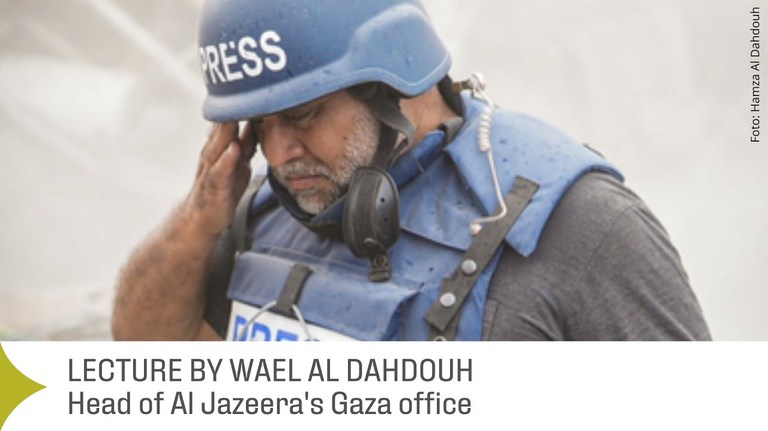

Lecture by the Gazan journalist Wael Al Dahdouh at Casa Árabe in Cordoba
Published at 16 04,,, 24 2024
ALL VIDEOS IN THIS CATEGORY
-
The Syrian Refugee Crisis: Socio-economic impact and humanitarian aid
Casa Árabe and the United Nations Relief and Works Agency for Palestine Refugees in the Near East (UNRWA), with the cooperation of Acción contra el Hambre (Action against Hunger) and Save the Children, have organized a round table discussion titled “The Regional Dimension of the Syrian Refugee Crisis (I): Socio-economic impact and humanitarian aid.” The objective was to analyze and make evident the regional dimension of the refugee crisis caused by the Syrian conflict, as well as the socio-economic impact it is having on the neighboring countries. It included interventions by Michael Kingsley-Nyinah, director of the UNRWA office in Syria; Jean-Raphäel Poitou, geographic director for the Middle East at Acción contra el Hambre (Action against Hunger); David del Campo, director of International Cooperation and Humanitarian Aid at Save the Children, and a representative of Doctors Without Borders (pending confirmation). The debate was moderated by the journalist Carla Fibla. More information: http://en.casaarabe.es/event/the-syrian-refugee-crisis-socio-economic-impact-and-humanitarian-aidPublished at 54 11,,, 15 2015 -
Geopolitics and Arab Societies: Keys to upheaval
On the occasion of the presentation of the books “Islamic State: Geopolitics of chaos” and “What Is Left of the Arab Uprisings?: Activists, changes and essentials,” three journalists analyzed the current situation. The round table included talks by Reem Khalifa, an activist and founder of the newspaper Al Wasat in Bahrain; Javier Martín, delegate of the Efe Press Agency in North Africa and author de “Estado Islámico: Geopolítica del caos” (“Islamic State: Geopolitics of chaos”) and David Perejil, a journalist and the editor of “¿Qué queda de las revueltas árabes?: Activistas, cambios y claves” (“What Is Left of the Arab Uprisings?: Activists, changes and essentials”). The event was presented by Karim Hauser, who is responsible for the Governance Area at Casa Árabe. More info: http://en.casaarabe.es/event/geopolitics-and-arab-societies-keys-to-today’s-upheavalPublished at 05 22,,, 15 2015 -
The sacred art of Kufic calligraphy: an aesthetic reflection
Valérie González, an expert on Islamic visual culture, gave this conference in Casa Árabe. One of the most important forms of artistic expression in Islam is Kufic calligraphy. It was precisely in this form of writing that God’s word in the Qur’an was taken down with devotion at the beginnings of Islam’s history. Valérie González analyzed the role played by writing and calligraphy, and more specifically Kufic writing, as artistic paradigms in Islamic logocentrism at this conference. She examined masterpieces of Kufic calligraphy used in different media, such as books, architecture and objects created by artists, to show how the sacred human act of setting down Divine Revelation in writing gave rise to a sublimating visualization that transcended beyond just religious art. A special emphasis was placed on the Samanid ceramics of the tenth and eleventh centuries, whose wonderful calligraphic decoration blurs the border between the ordinary and the extraordinary, so deeply rooted within the West’s aesthetic consciousness. More info: http://en.casaarabe.es/event/the-sacred-art-of-kufic-calligraphy-an-aesthetic-reflectionPublished at 27 22,,, 15 2015 -
#ArabSpring four years later. Session 4
Seminar on “Citizen entrepreneurship, political participation and artistic expression among Arab youths.” SESSION 4: ARTISTIC EXPRESSION AND CULTURAL MANIFESTATIONS “Creativity and spaces for freedom.” Malu Halasa, writer and editor of the book “Syria Speaks” “The walls speak: art in the streets.” Anahi Alviso, a researcher at the Centre Français d’Archéologie et de Sciences Sociales de Sanaa (CEFAS) “People’s theater and collective memory.” Jaouad Essounani, director of the company Dabateatr Moderated by: Nuria Medina, Coordinator of Culture and New Media, Casa Árabe More information: http://en.casaarabe.es/event/arabspring-cuatro-anos-despuesPublished at 06 17,,, 15 2015 -
#ArabSpring four years later. Session 3
Seminar on “Citizen entrepreneurship, political participation and artistic expression among Arab youths.” SESSION 3: MOVEMENTS AND SOCIAL DYNAMICS “The importance of discontent: Arab faces and perceptions of injustice.” Middle East Center, associate researcher, Carnegie-Middle East Center “Activism and human rights.” Mohammed al Maskati, consultant and defender of Human Rights, The Bahrain Youth Society for Human Rights “Mental health in countries affected by conflicts.” Sally Toma, psychologist, therapist and activist. Kazeboon Moderated by: Leila Nachawati, a professor of Communication at the Universidad Carlos III and co-founder of the portal Syria Untold. More information: http://en.casaarabe.es/event/arabspring-cuatro-anos-despuesPublished at 04 17,,, 15 2015





